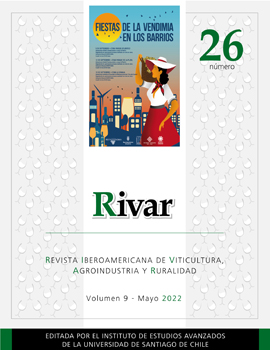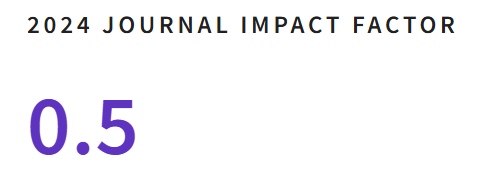Adoption of Technologies in Agrofoods Production Systems: A Literature Review
DOI:
https://doi.org/10.35588/rivar.v9i26.5575Keywords:
technological adoption, dairy production, agrofoods technology, technological adoption model, robotic, digital technologyAbstract
Technology adoption models comprise an important field of research in the studies of economics, anthropology, sociology and psychology of innovation, applied to different productive and social sectors. Primary food production companies have been adopting new techniques and technologies that allow them to improve their quality, increase their productivity and competitiveness. The search criteria were: Technological adoption, Dairy production, agrofoods technology, Technological adoption model, robotic and digital technology. The work allows us to warn of the emergence of dimensions and variables, as well as to carry out theoretical-conceptual, technical-methodological combinations with socio-technical studies, thereby giving way to an interdisciplinary research agenda with a view to improving the management process of the technology adoption process.
Downloads
References
Abdullah, F. y Ward, R. (2016). “Developing a General Extended Technology Acceptance Model for E-Learning (GETAMEL) by Analysing Commonly Used External Factors”. Computers in Human Behavior 56: 238-256. DOI https://doi.org/10.1016/j.chb.2015.11.036
Alwahaishi, S. y Václav, S. (2013). “Consumers’ Acceptance and Use of Information and Communications Technology: A UTAUT and Flow Based Theoretical Model”. Journal of Technology Management and Innovation 8(2): 61-73. DOI https://doi.org/10.4067/s0718-27242013000200005
Arellanes P. y Lee, D. (2003). “The Determinants of Adoption of Sustainable Agriculture Technologie: Evidence from the Hillsides of Honduras”. En 25th Conference of Agricultural Economists. Durban, 16 a 22 de agosto 2003: 693-699.
Bianco, M. (2014). “Evaluación social de tecnologías: algunas evidencias de impacto en la lechería uruguaya”. Agrociencia Uruguay 18(1): 141-152.
Chen, C.; Zhang, J. y Delaurentis, T. (2014). “Quality Control in Food Supply Chain Management: An Analytical Model and Case Study of the Adulterated Milk Incident in China”. International Journal of Production Economics 152(C): 188-199. DOI https://doi.org/10.1016/j.ijpe.2013.12.016
Chuttur, MY. (2009). “Overview of the Technology Acceptance Model: Origins, Developments and Future Directions”. All Sprouts Content 290: 9-37.
Davis, F. (1989). “Perceived Usefulness, Perceived Ease of Use, and User Acceptance of Information”. MIS QUARTERLY 13(3): 319-340. DOI https://doi.org/10.2307/249008
De Baerdemaeker, J. (2013). “Precision Agriculture Technology and Robotics for Good Agricultural Practices”. IFAC Proceedings Volumes 46: 1-4. DOI https://doi.org/10.3182/20130327-3-jp-3017.00003
de Mello, M.; Meirelles de Souza, H.; Carrer, M.; Barioni, W. y Ribas, F. (2016). “Complementarity in the Adoption of Traceability of Beef Cattle in Brazil”. Production 3: 540-550. DOI https://doi.org/10.1590/0103-6513.193615
Ding, H.; Fu, Y.; Zheng, L. y Yan, Z. (2019). “Determinants of the Competitive Advantage of Dairy Supply Chains: Evidence from the Chinese Dairy Industry”. International Journal of Production Economics 209(C): 360-373. DOI https://doi.org/10.1016/j.ijpe.2018.02.013
Fernández, K.; Vallejo, A. y McAnally, L. (2015). “Apropiación tecnológica: una visión desde los modelos y las teorías que la explican”. Perspectiva Educacional, Formación de Profesores 54(2): 109-125. DOI https://doi.org/10.4151/07189729-vol.54-iss.2-art.331
Griliches, Z. (1992). “The Search for R&D Spillovers”. Scand. J. of Economics 94: 29-47.
Higgins, V.; Bryants, M.; Howell, A. y Battersby, J. (2017). “Ordering Adoption: Materiality, Knowledge and Farmer Engagement with Precision Agriculture Technologies”. Journal of Rural Studies 55: 193-202. DOI https://doi.org/10.1016/j.jrurstud.2017.08.011
Hosseinifarhangi, M.; Turvani, M.; Van der Valk, A. y Carsjens, G. (2019). “Technology-Driven Transition in Urban Food Production Practices: A Case Study of Shanghai”. Sustainability 11(21): 6070. DOI https://doi.org/10.3390/su11216070
Jenkins, A.; Velandia, M.; Lambert, D.; Roberts, R.; Larson, J.; English, B. y Martin, S. (2011). “Factors Influencing the Selection of Precision Farming Information Sources by Cotton Producers”. Agricultural and Resource Economics Review 40/2: 307-320. DOI https://doi.org/10.1017/s106828050000808x
Klerkx, L. y Rose, D. (2019). “A Review of Social Science on Digital Agriculture, Smart Farming and Agriculture 4.0: New Contributions and a Future Research Agenda”. NJAS – Wageningen Journal of Life Science 90-91: 100315. DOI https://doi.org/10.1016/j.njas.2019.100315
Kutter, T.; Tiemann, S.; Siebert, R. y Fountas, S. (2009). “The role of Communication and Co-Operation in the Adoption of Precision Farming”. Precision Agriculture 12(1): 2-17. DOI https://doi.org/10.1007/s11119-009-9150-0
Lajoie-O’Malley, A.; Bronson, K.; van der Burg, S. y Klerkx, L. (2020). “The Future(s) of Digital Agriculture and Sustainable Food Systems: An Analysis of High-Level Policy Documents”. Ecosystem Services 45: 101183. DOI https://doi.org/10.1016/j.ecoser.2020.101183
Li, W.; Li, Y.; Yang, W.; Zhang, G.; Wei, D.; Li, W. et al. “Brain Structures and Functional Connectivity Associated with Individual Differences in Internet Tendency in Healthy Young Adults”. Neuropsychologia 70: 134-144. DOI https://doi.org/10.1016/j.neuropsychologia.2015.02.019
Mansfield, E. (1963). “Size of Firm, Market Structure, and Innovation”. Journal of Political Economy 71(6): 556-576. DOI https://doi.org/10.1086/258815
Mora, M.; Lerdon, J.; Torralbo, L.; Salazar, J.; Boza, S. y Vásquez, R. (2012). “Definición de las brechas en el uso de las Tic’s para la innovación productiva en pymes del sector pecuario chileno”. J. Technol. Manag. Innov. 7(2): 171-182. DOI https://doi.org/10.4067/s0718-27242012000200014
Moreno, M. (2014). “Las formas de organización y gestión en empresas agropecuarias pampeanas: estudio de caso de grandes unidades en el noroeste de la provincia de Buenos Aires”. Revista Pilquen 17(2): 1-13.
Naspetti, S.; Mandolesi, S.; Buysse, J.; Latvala, T.; Nicholas, P.; Padel, S. y Zanoli, R. (2017). “Determinants of the Acceptance of Sustainable Production Strategies among Dairy Farmers: Development and Testing of a Modified Technology Acceptance Model”. Sustainability 9(10): 1805. DOI https://doi.org/10.3390/su9101805
Pappa, I.; Iliopoulos, C. y Massouras, T. (2018). “What Determines the Acceptance and Use of Electronic Traceability Systems in Agri-Food Supply Chains?”. Journal of Rural Studies 58: 123-135. DOI https://doi.org/10.1016/j.jrurstud.2018.01.001
Rodríguez, H.; Ramírez, C. y Restrepo, F. (2015). “Factores que influencian en la adopción de tecnologías de gestión de producción lechera”. Temas Agrarios 20(1): 34-44. DOI https://doi.org/10.21897/rta.v20i1.746
Rosenberg, N. (1972). “Factors Affecting the Diffusion of Technology”. Explorations in Economic History 10(1): 3-33. DOI https://doi.org/10.1016/0014-4983(72)90001-0
Sánchez, B.; Zegbe, J. y Rumayor, A. (2013). “Propuesta para evaluar el proceso de adopción de innovaciones tecnológicas”. Revista Mexicana de Ciencias Agrícolas 4(6): 855-868.
DOI https://doi.org/10.29312/remexca.v4i6.1154
Ugochukwu, A. y Phillips, P. (2018). “Technology Adoption by Agricultural Producers: A Review of the Literature”. En Kalaitzandonakes, N.; Carayannis, E.; Grigoroudis, E. y Rozakis, S. (eds.). From Agriscience to Agribusiness. Nueva York, Springer: 361-377.
Vélez, I.; Espinosa, G.; Omaña, S.; González, O. y Quiroz, V. (2013). “Adopción de Tecnología en Unidades de Producción de Lechería Familiar en Guanajato, México”. Actas Iberoamericanas de Conservación Animal 3: 88-96.
Venkatesh, V. y Davis, F. (2000). “A Theoretical Extension of the Technology Acceptance Model: Four Longitudinal Field Studies”. Management Science 46(2): 186-204. DOI https://doi.org/10.1287/mnsc.46.2.186.11926
Wilkis, A. (2014). “Sociología del crédito y economía de las clases populares”. Revista mexicana de sociología 76(2): 225-252.
Yong, L. (2004). “Modelo de aceptación tecnológica (TAM) para determinar los efectos de las dimensiones de cultura nacional en la aceptación de las TIC”. Revista Internacional de Ciencias Sociales y Humanidades, SOCIOTAM 14(1): 131-171.
Downloads
Submitted
2022-06-20Published
Versions
- 2024-08-16 (2)
- 2022-05-31 (1)









